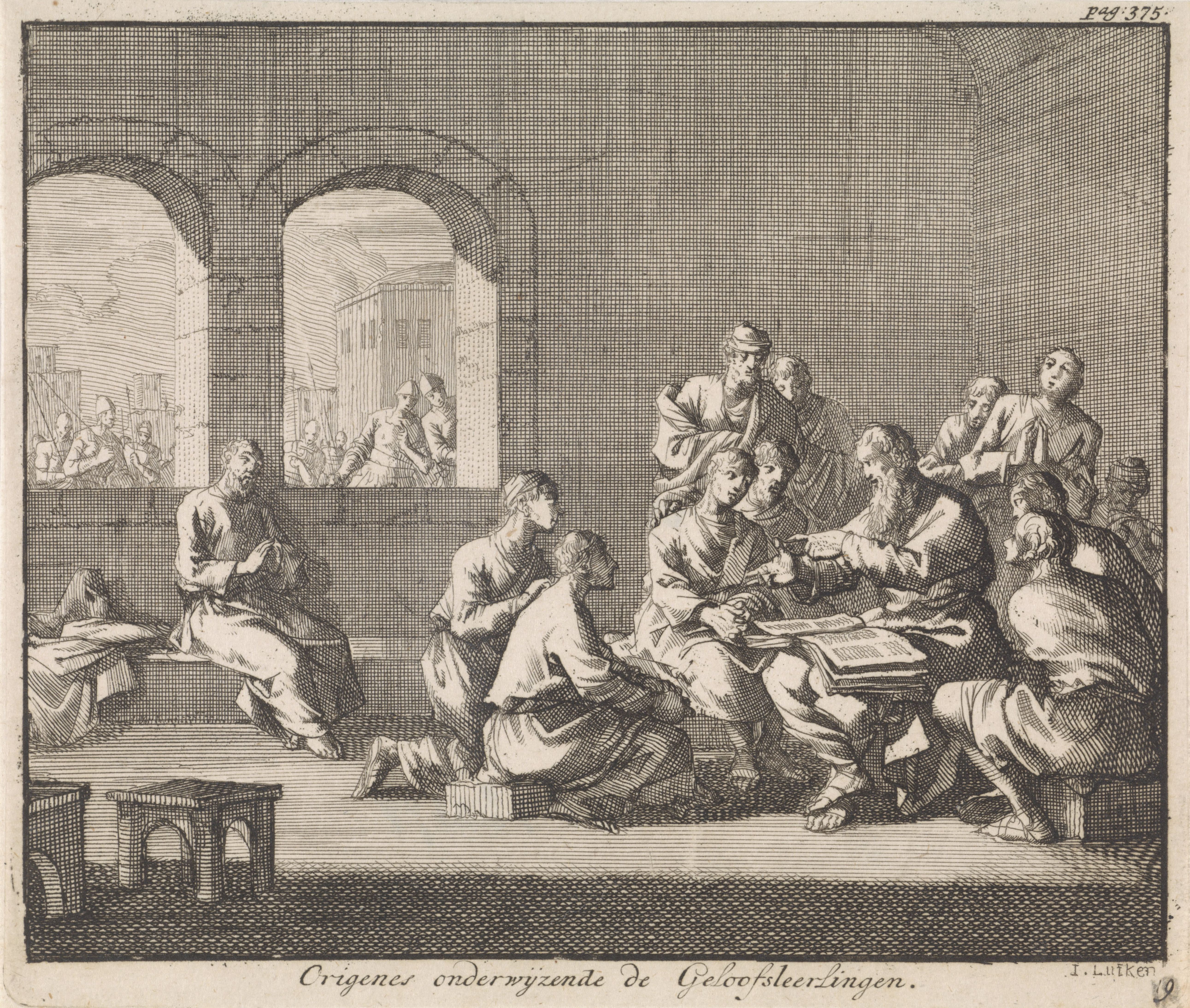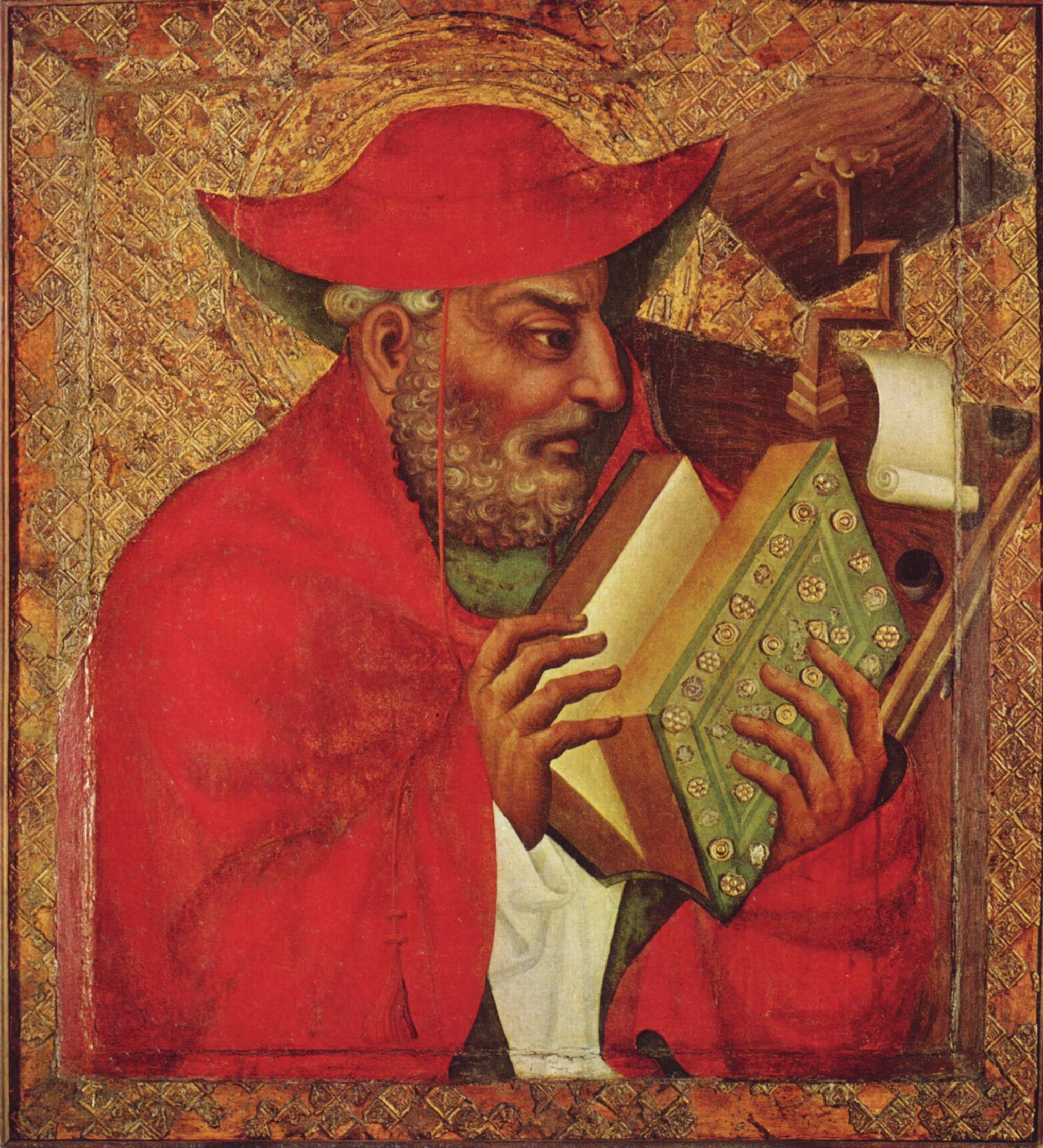|
Trypho (theologian)
Trypho (; ) was a Christian theologian and Bible scholar of the 3rd century. He was a pupil of Origen. In Jerome's ''De viris illustribus'', he writes that Trypho wrote on the red heifer (Numbers 19 The book of Numbers (from Greek Ἀριθμοί, ''Arithmoi''; he, בְּמִדְבַּר, ''Bəmīḏbar'', "In the desert f) is the fourth book of the Hebrew Bible, and the fourth of five books of the Jewish Torah. The book has a long and ...) and about the sacrifices offered by Abraham in Genesis 9. He may be the same Tryphon as is named as a martyr in the ''Acta Tryphonis'', who died in the Decian persecution of 249–51. References {{reflist 3rd-century Christian theologians Year of birth unknown Year of death unknown Origen ... [...More Info...] [...Related Items...] OR: [Wikipedia] [Google] [Baidu] |
Theologian
Theology is the systematic study of the nature of the divine and, more broadly, of religious belief. It is taught as an academic discipline, typically in universities and seminaries. It occupies itself with the unique content of analyzing the supernatural, but also deals with religious epistemology, asks and seeks to answer the question of revelation. Revelation pertains to the acceptance of God, gods, or deities, as not only transcendent or above the natural world, but also willing and able to interact with the natural world and, in particular, to reveal themselves to humankind. While theology has turned into a secular field , religious adherents still consider theology to be a discipline that helps them live and understand concepts such as life and love and that helps them lead lives of obedience to the deities they follow or worship. Theologians use various forms of analysis and argument ( experiential, philosophical, ethnographic, historical, and others) to help understan ... [...More Info...] [...Related Items...] OR: [Wikipedia] [Google] [Baidu] |
Bible Scholar
Biblical criticism is the use of critical analysis to understand and explain the Bible. During the eighteenth century, when it began as ''historical-biblical criticism,'' it was based on two distinguishing characteristics: (1) the concern to avoid dogma and bias by applying a neutral, non-sectarian, reason-based judgment to the study of the Bible, and (2) the belief that the reconstruction of the historical events behind the texts, as well as the history of how the texts themselves developed, would lead to a correct understanding of the Bible. This sets it apart from earlier, pre-critical methods; from the anti-critical methods of those who oppose criticism-based study; from later post-critical orientation, and from the many different types of criticism which biblical criticism transformed into in the late twentieth and early twenty-first centuries. Most scholars believe the German Enlightenment () led to the creation of biblical criticism, although some assert that its roots ... [...More Info...] [...Related Items...] OR: [Wikipedia] [Google] [Baidu] |
Origen
Origen of Alexandria, ''Ōrigénēs''; Origen's Greek name ''Ōrigénēs'' () probably means "child of Horus" (from , "Horus", and , "born"). ( 185 – 253), also known as Origen Adamantius, was an Early Christianity, early Christian scholar, Asceticism#Christianity, ascetic, and Christian theology, theologian who was born and spent the first half of his career in Early centers of Christianity#Alexandria, Alexandria. He was a prolific writer who wrote roughly 2,000 treatises in multiple branches of theology, including textual criticism, exegesis, biblical exegesis and biblical hermeneutics, hermeneutics, homiletics, and spirituality. He was one of the most influential and controversial figures in early Christian theology, Christian apologetics, apologetics, and asceticism. He has been described as "the greatest genius the early church ever produced". Origen sought martyrdom with his father at a young age but was prevented from turning himself in to the authorities by his mother ... [...More Info...] [...Related Items...] OR: [Wikipedia] [Google] [Baidu] |
Jerome
Jerome (; la, Eusebius Sophronius Hieronymus; grc-gre, Εὐσέβιος Σωφρόνιος Ἱερώνυμος; – 30 September 420), also known as Jerome of Stridon, was a Christian presbyter, priest, Confessor of the Faith, confessor, theologian, and historian; he is commonly known as Saint Jerome. Jerome was born at Stridon, a village near Emona on the border of Dalmatia (Roman province), Dalmatia and Pannonia. He is best known for his translation of the Bible into Latin (the translation that became known as the Vulgate) and his commentaries on the whole Bible. Jerome attempted to create a translation of the Old Testament based on a Hebrew version, rather than the Septuagint, as Vetus Latina, Latin Bible translations used to be performed before him. His list of writings is extensive, and beside his biblical works, he wrote polemical and historical essays, always from a theologian's perspective. Jerome was known for his teachings on Christian moral life, especially to th ... [...More Info...] [...Related Items...] OR: [Wikipedia] [Google] [Baidu] |
De Viris Illustribus (Jerome)
''De Viris Illustribus'' (''On Illustrious Men'') is a collection of short biographies of 135 authors, written in Latin, by the 4th-century Latin Church Father Jerome. He completed this work at Bethlehem in 392–393 AD. The work consists of a prologue plus 135 chapters, each consisting of a brief biography. Jerome himself is the subject of the final chapter. A Greek version of the book, possibly by the same Sophronius who is the subject of Chapter 134, also survives. Many biographies take as their subject figures important in Christian Church history and pay especial attention to their careers as writers. It "was written as an apologetic work to prove that the Church had produced learned men." The book was dedicated to Flavius Lucius Dexter, who served as high chamberlain to Theodosius I and as praetorian prefect to Honorius. Dexter was the son of Saint Pacianus, who is eulogized in the work. Contents Listed below are the subjects of Jerome's 135 biographies. The numb ... [...More Info...] [...Related Items...] OR: [Wikipedia] [Google] [Baidu] |
Numbers 19
The book of Numbers (from Greek Ἀριθμοί, ''Arithmoi''; he, בְּמִדְבַּר, ''Bəmīḏbar'', "In the desert f) is the fourth book of the Hebrew Bible, and the fourth of five books of the Jewish Torah. The book has a long and complex history; its final form is possibly due to a Priestly redaction (i.e., editing) of a Yahwistic source made some time in the early Persian period (5th century BC). The name of the book comes from the two censuses taken of the Israelites. Numbers begins at Mount Sinai, where the Israelites have received their laws and covenant from God and God has taken up residence among them in the sanctuary. The task before them is to take possession of the Promised Land. The people are counted and preparations are made for resuming their march. The Israelites begin the journey, but they "grumble" at the hardships along the way, and about the authority of Moses and Aaron. For these acts, God destroys approximately 15,000 of them through v ... [...More Info...] [...Related Items...] OR: [Wikipedia] [Google] [Baidu] |
Tryphon, Respicius, And Nympha
Saint Tryphon of Campsada (; also spelled ''Trypho'', ''Trifon'', ''Triphon'') was a 3rd-century Christian saint. He is venerated by the Roman Catholic and Eastern Orthodox churches as a great martyr and holy unmercenary. Saint Tryphon was formerly celebrated jointly with Saints Respicius and Nympha on 10 November in the liturgical calendar of the Latin Church from the eleventh century until the twentieth, and remains on the liturgical calendar of the extraordinary form of the Roman rite. Saint Tryphon continues to be celebrated (separately) on on both the Orthodox liturgical calendar and the Roman Calendar of Saints. Life Saint Tryphon is said to have been born at Kampsada in Phrygia (now Turkey), and as a boy took care of geese. His name is derived from the Greek τρυφή ( ''tryphe'') meaning "softness, delicacy". He acquired fame as a healer, especially of animals, and is considered one of the Holy Unmercenaries, particularly invoked on farms. During the Decian persec ... [...More Info...] [...Related Items...] OR: [Wikipedia] [Google] [Baidu] |
Christian Martyr
In Christianity, a martyr is a person considered to have died because of their testimony for Jesus or faith in Jesus. In years of the early church, stories depict this often occurring through death by sawing, stoning, crucifixion, burning at the stake or other forms of torture and capital punishment. The word ''martyr'' comes from the Koine word μάρτυς, ''mártys'', which means "witness" or "testimony". At first, the term applied to Apostles. Once Christians started to undergo persecution, the term came to be applied to those who suffered hardships for their faith. Finally, it was restricted to those who had been killed for their faith. The early Christian period before Constantine I was the "Age of Martyrs". "Early Christians venerated martyrs as powerful intercessors, and their utterances were treasured as inspired by the Holy Spirit." In western Christian art, martyrs are often shown holding a palm frond as an attribute, representing the victory of spirit over f ... [...More Info...] [...Related Items...] OR: [Wikipedia] [Google] [Baidu] |
Decian Persecution
The Decian persecution of Christians occurred in 250 AD under the Roman Emperor Decius. He had issued an edict ordering everyone in the Empire to perform a sacrifice to the Roman gods and the well-being of the emperor. The sacrifices had to be performed in the presence of a Roman magistrate, and be confirmed by a signed and witnessed certificate from the magistrate. Although the text of the edict has been lost, many examples of the certificates have survived. Decius' edict was intended to act as an Empire-wide loyalty oath to the new emperor (who had come to power in 249 AD), sanctified through the Roman religion. Christian monotheistic beliefs did not allow them to worship any other gods, so they were forced to choose between their religious beliefs and following the decree. An unknown number of Christians were executed or died in prison for refusing to perform the sacrifices, including Pope Fabian. Others went into hiding, whilst many apostatized and performed the c ... [...More Info...] [...Related Items...] OR: [Wikipedia] [Google] [Baidu] |
3rd-century Christian Theologians
The 3rd century was the period from 201 ( CCI) to 300 (CCC) Anno Domini (AD) or Common Era (CE) in the Julian calendar.. In this century, the Roman Empire saw a crisis, starting with the assassination of the Roman Emperor Severus Alexander in 235, plunging the empire into a period of economic troubles, barbarian incursions, political upheavals, civil wars, and the split of the Roman Empire through the Gallic Empire in the west and the Palmyrene Empire in the east, which all together threatened to destroy the Roman Empire in its entirety, but the reconquests of the seceded territories by Emperor Aurelian and the stabilization period under Emperor Diocletian due to the administrative strengthening of the empire caused an end to the crisis by 284. This crisis would also mark the beginning of Late Antiquity. In Persia, the Parthian Empire was succeeded by the Sassanid Empire in 224 after Ardashir I defeated and killed Artabanus V during the Battle of Hormozdgan. The Sassani ... [...More Info...] [...Related Items...] OR: [Wikipedia] [Google] [Baidu] |







.jpg)
